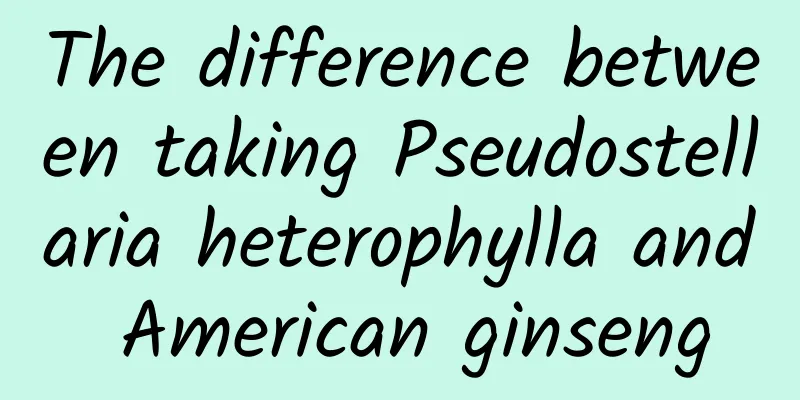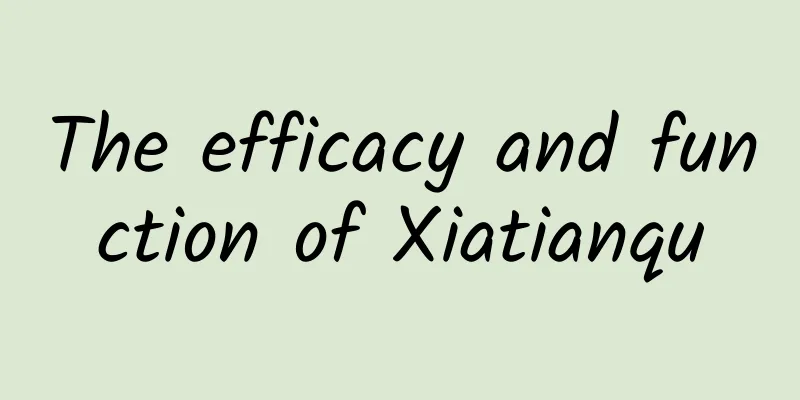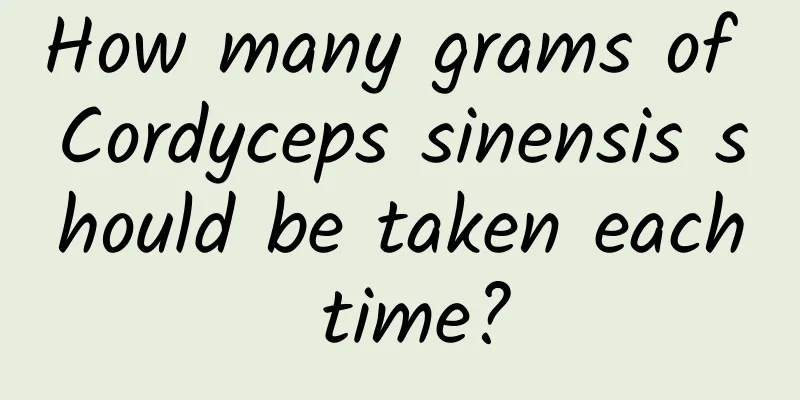The difference between taking Pseudostellaria heterophylla and American ginseng

|
Ginseng is one of the common tonics and traditional Chinese medicinal materials in my country, and there are many types of ginseng. Among them, Pseudostellaria heterophylla and American ginseng are more well-known. Therefore, many people cannot distinguish the difference between the two. Today I will introduce to you the differences between Pseudostellaria heterophylla and American ginseng, as well as the contraindications and requirements for taking them! I hope this can be helpful to everyone. Both Radix Pseudostellariae and American ginseng are Qi-tonifying drugs with similar properties and flavors. They both have the effects of invigorating Qi and nourishing Yin. They can both be used for symptoms of Qi and Yin deficiency, or damage to both Qi and Yin with concurrent heat symptoms. However, due to their different drug sources, the two have their own strengths and functions, and their clinical applications are also different. Pseudostellaria heterophylla, also known as baby's ginseng, is the root of the plant Pseudostellaria heterophylla of the Caryophyllaceae family. It tastes sweet and slightly bitter, is slightly cold in nature, and enters the spleen and lung meridians. It is suitable for spleen and lung deficiency, and insufficient Qi and Yin. However, its tonic effect is far weaker than that of ginseng. It must be taken continuously in large doses when used alone to have a significant effect. In clinical treatment of patients with weak constitution and yin deficiency, or weakness after illness, fatigue, loss of appetite, it is often used together with Codonopsis pilosula, Rehmannia glutinosa, Atractylodes macrocephala, Angelica sinensis and other drugs. It is used to treat qi and yin deficiency, palpitations, insomnia, forgetfulness, hot flashes and sweating, etc. It is often used together with Schisandra chinensis, Ziziphus jujuba seed, Platycladus orientalis seed, and Angelica sinensis. It is used to treat spleen deficiency, insufficient stomach yin, indigestion, abdominal distension, fatigue and weakness, etc. It is often used together with yam, polygonatum, and barley sprouts. It is often used together with yin-nourishing, lung-moistening and cough-relieving medicines such as Northern Adenophora, Lilium, and Fritillaria cirrhosa to treat symptoms such as yin deficiency and lung dryness, dry cough and little sputum. It is used to treat fever with damage to both body fluid and Qi, thirst and fatigue, and is often used together with Rehmannia glutinosa, Ophiopogon japonicus, Adenophora pilosula and other medicines. If used to treat children who are weak and powerless after illness, and who sweat excessively, this product is often used together with Astragalus, Floating Wheat, and Schisandra. In addition, this product is used in combination with Rhizoma Cyperi, Bamboo Leaves, and Ophiopogon japonicus for children with prolonged fever or summer fever. This product can be made into a ginseng-flavor mixture with Schisandra chinensis and Ziziphus jujuba seeds, which has a good effect in treating neurasthenia. It is used for phlegm stagnation in the lungs, cough with excessive phlegm, which does not heal for a long time and has symptoms such as insufficient Qi and Yin, dry mouth and fatigue. This product can be used together with Trichosanthes, Houttuynia cordata, Peucedanum and other heat-clearing and phlegm-resolving drugs. American ginseng is the root of the Araliaceae plant American ginseng, which comes from North America. It tastes sweet and bitter, is cold in nature, and enters the lung, heart, and kidney meridians. It has the effects of invigorating qi and nourishing yin, clearing away fire and relieving heat, and producing body fluids. It is suitable for symptoms of insufficient Qi and Yin, and excess fire. For example, it is used together with asparagus, ophiopogon, donkey-hide gelatin, Fritillaria cirrhosa, etc. to treat lung yin deficiency, cough due to deficiency heat, hemoptysis or blood in sputum. It is used to treat febrile diseases or damage to body fluids after illness, or when the heat evil has not been completely eliminated but the vital energy has been damaged, as well as restlessness and thirst. It is often used together with fresh Rehmannia glutinosa, Radix Trichosanthis, Ophiopogon japonicus, and Schisandra chinensis. It is often used together with gypsum, Ophiopogon japonicus, and Achyranthes bidentata to treat insufficient stomach yin. This product can be decocted and taken alone to treat lack of body fluid and dry mouth. For chest heat and bloody stool, you can take steamed longan meat with this product orally, which has the effect of clearing the intestines and stopping bleeding. Both Prince ginseng and American ginseng are suitable for symptoms of insufficient qi and yin, and deficiency with heat. However, in terms of replenishing qi and nourishing yin, clearing fire and promoting body fluid, Pseudostellaria ginseng is not as good as American ginseng. Therefore, Pseudostellaria ginseng should be used for those who have insufficient qi and yin but not excessive heat. If both Qi and Yin are damaged and heat is severe, American ginseng should be used. For general mild cases, Pseudostellaria baicalensis can be used instead of American ginseng. Based on the above introduction, I believe everyone now has a certain knowledge and understanding of Pseudo-ginseng and American ginseng. It will also be used as a reference in the future selection process. However, Pseudostellaria heterophylla and American ginseng cannot be taken casually. The key lies in individual differences. Therefore, if necessary, please seek the advice of a professional doctor. |
<<: Can the elderly eat ginseng in summer?
>>: What are the medicinal values of Pseudostellaria heterophylla
Recommend
The efficacy and function of Maocaolong
As for tricholoma, I think some people may have h...
The efficacy and function of bitter stone lotus
Echeveria is a very common Chinese medicine and i...
The efficacy and function of water spinach needle
The traditional Chinese medicine water spiny need...
The efficacy and function of red medicine
Do you know red medicine seeds? It is a common Ch...
The efficacy and role of lead
Traditional Chinese medicine lead is often used b...
Can eating garlic, tomatoes and black fungus help fight cancer? You may be overthinking...
Rumor : "Certain food ingredients can fight ...
Learn the most comprehensive guide to snow disaster prevention in one article to save yourself at critical moments
Snow is generally romantic and harmless, but it c...
Have you been eating CP today? Six years later, this "model couple" finally has a child again
The daily companionship of the model couple Red E...
After being abducted for 53 years, she almost saw her mother - but she died
On August 18, the Miami Seaquarium in the United ...
The mass of the Earth is about 600 trillion tons, so can we calculate the mass of larger and more distant stars?
The mass of the Earth is 5.965x10∧24 kilograms, w...
Special: How magical is the Chishui River?
On the land of China Among thousands of rivers Ch...
Can pregnant women eat donkey-hide gelatin after giving birth?
Pregnant women will lose a lot of vitality after ...
Can Morinda officinalis nourish the kidney?
For men, the importance of kidney tonification is...
What are the effects of dried seahorse?
Seahorses are not common in our lives. They have ...









